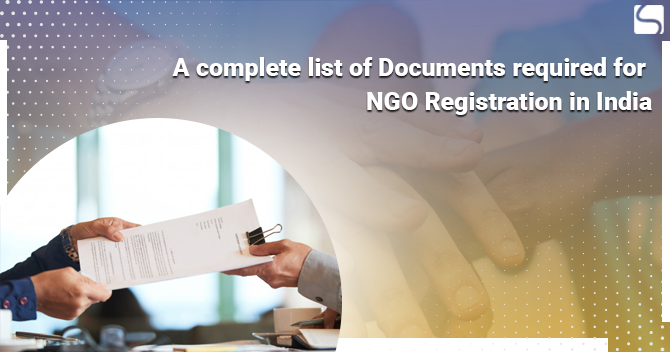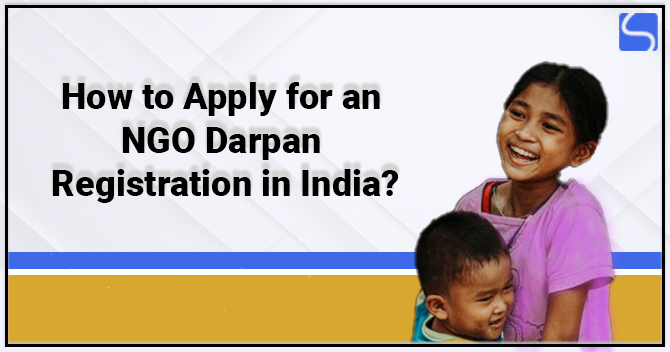A complete list of Documents required for NGO Registration in India

Japsanjam Kaur Wadhera | Updated: Jan 12, 2021 | Category: NGO
A Non- Governmental organisation is an organisation with the objective of promoting social welfare and betterment of society. It is an organisation with a charitable objective. An NGO can be started as Trust, a Society or a Non- Profit Company (Section 8 Company), based on the activity undertaken. It is active in human rights, public policy, health care, humanitarian, educational, environmental, and social and other areas to bring changes according to their objectives. A registered NGO achieves a legal status and gets many benefits under the registration. Therefore, it is advisable to those starting an NGO to opt for NGO registration to avail the benefits upon it. This article will provide you with the details regarding the registration process and a complete list of documents required for NGO Registration in India.
Table of Contents
Benefits of registering an NGO in India
- A registered NGO strengthens the social, ethical and legal norms of our society.
- Upon the registration of an NGO, it achieves a legal status and becomes accountable for the funds received. That is, when funds are received by the charitable trust, it is received under the name of the organization and used for the purpose of trust’s activities. But, in an unregistered organization, the assets can be received under anyone’s name and may also be used for their own profit. Therefore, it is advisable to register an NGO in India.
- It is necessary to register an NGO to seek tax exemption from the Income Tax Authority.
- It is necessary to have a bank account for an NGO under its name to conduct its operations. And to open a bank account, it is necessary to be registered as a Trust, society or Section 8 Company.
Registration of NGO- Trusts, Society, Section 8 Company in India
The registration of an NGO as a legal entity can be done in three ways:
- Trusts
- Society
- Section 8 Company
An NGO can be registered under the Trust Act, Society Act and Companies Act.
Trusts
An NGO can be registered as a charitable trust. A Trust is a legal entity which is formed by the ‘Settler’ or ‘Trustor’ who transfers the assets to the ‘Trustee’ or the second party for the benefit of the ‘Beneficiary’ or the third party. The trusts are formed to support and help the impoverished and deprived sections of the society. A Trust can be registered by any group of individuals and there are no specific laws as such to govern the public trust in India. However, some states like Tamil Nadu and Maharashtra have their own Public Trust Act.
Society
Societies are governed by the Societies Registration Act, 1860. It must be registered with the respective state registrar of societies to be eligible for being exempted from paying tax. A group of Individuals unite together to form a society in the cause for promoting arts, science, social welfare, literature and other useful information. The societies work for maintaining public libraries and museum and for creating military orphan funds.
Section 8 Company
A section 8 Company is registered under the Companies Act, 2013 for the charitable purpose. The objective of section 8 companies is to promote science, arts, commerce, social welfare, sports, charity, religion and environmental protection. It is similar to Trust and Society. A Section 8 Company has better credibility among the government bodies, stakeholders and donors. Section 8 Company is registered as a Non- Profit Organization (NPO). It operates exactly like a Private Limited Company in accordance with the rules and regulations of the Companies Act including all the rights and obligations that comes with it.
What are the documents required for NGO registration in India?
NGO registration is must for the organizations to avail the benefits upon the registration. Therefore, the documents required for NGO registration in India are as follows: –
Trust Registration
The following papers are mandatory for the Trust registration:
- Aadhar Card.
- Driving License.
- Passport.
- Voter ID.
- A bill of water or electricity stating the address that is required to be registered.
Once the registration payment is done, it takes around 8 to 10 days to complete the registration done online under the Indian Trust Act 1882[1]. The Trustor has to deliver a presentation at the registrar’s office before the deed becomes valid throughout the country.
Note: the Author of the Trust must be present in the Registrar office for registration on the scheduled date for the registration.
Society Registration
The following papers are mandatory for Society registration:
- Two copies of Memorandum of Association and by-laws of the society.
- Identity proof of nice members.
- Aadhar Card.
- Voter ID.
- Passport.
- Driving license.
- Address proof of the office- water bill or electricity bill.
- Name of the society.
Note: It takes around 8 to 10 days to draft the Memorandum of Association (MOA) and by-laws of the society, once the payment for the registration is done. And thereafter, it takes around 21 to 30 days to for the society to be registered.
Section 8 Company
The following papers are mandatory for Section 8 Company registration:
- Memorandum of Association (MOA).
- Articles of Association (AOA).
- Company’s name for the approval.
- Aadhar Card.
- Voter ID.
- Copy of passport.
- Driving license/ identity proof of all the directors.
- Address proof of the office that is, water bill or electricity bill or tax receipt.
Note: It takes around 8 to 10 days to draft the Memorandum of Association (MOA) and Articles of Association (AOA) of the Section 8 Company once the payment for the registration is done. And thereafter, it takes around 2 months to complete the entire company registration.
Comparison between the Trusts, Society and Section 8 Company
|
Basis |
Trust |
Society |
Section 8 Company |
|
Governed by |
Indian Trust Act, 1882. |
Society Registration Act 1860, which is an all- India Act. |
Indian Companies Act, 2013.
|
|
Members |
2 |
7 for local, 8 for national level |
2 |
|
Jurisdiction |
Charity Commissioner of the relevant area/ Deputy Registrar. |
Registrar of Societies (charity commissioner in Maharashtra). |
Registrar of Companies and Regional Director. |
|
Document |
Trust deed is the main document. |
MOA and rules and regulations. |
MOA and AOA. |
|
Board |
Trustees or Board of Trustees. |
Managing Committee or Governing Council. |
Board of Directors. |
|
Legal title held |
Trustees hold the legal title of property. |
Properties held in the name of Society. |
Property of the company vests in the name of the Company and same can be sold as per the rules mentioned under the Companies Act. |
|
Dissolution or Winding Up |
Generally no. |
Can be dissolved with consent or approval of 3/5th members. |
Can be dissolved. |
|
Annual Compliance/returns |
Not required. |
To be filed with Registrar of Societies. |
To be filed with Registrar of Companies (ROC). |
|
TIME TAKEN FOR REGN |
10-15 working days. |
30- 40 working days. |
60- 70 working days. |
|
COST INVOLVED |
Low. |
Medium. |
High. |
Conclusion
Registering an NGO is beneficial for an organization to avail the benefits of tax exemption and as well as many benefits upon the registration. A complete list of documents required for NGO registration in India has been discussed above in the article. The rules and procedure must be followed properly in accordance with the prescribed Act under which an NGO is formed.
Also, Read: What is Copyright Infringement and Remedies in India?















